Program Evaluation in Health Promotion: Types, Importance, Methods
VerifiedAdded on 2022/11/26
|11
|2465
|215
Report
AI Summary
This report provides a comprehensive overview of program evaluation, focusing on its significance in health promotion. It defines and differentiates between the four main types of evaluation: formative, process, outcome, and impact, detailing their respective roles and importance. The report emphasizes the benefits of evaluation, such as monitoring progress, determining program effectiveness, justifying financial support, and ensuring resource allocation to productive projects. It also addresses the challenges faced in health promotion, including a lack of effective measurement indicators, limited cooperation from participants, and a scarcity of research on quality practices. The report further outlines how to conduct different evaluation methods like process, impact, and outcome evaluations, and concludes by highlighting the importance of continuous evaluation for improving practices and meeting community needs. The report references various academic sources to support its findings and recommendations.

PROGRAM EVALUATION 1
PROGRAM EVALUATION
Name
Course name
Instructor
Date
PROGRAM EVALUATION
Name
Course name
Instructor
Date
Paraphrase This Document
Need a fresh take? Get an instant paraphrase of this document with our AI Paraphraser
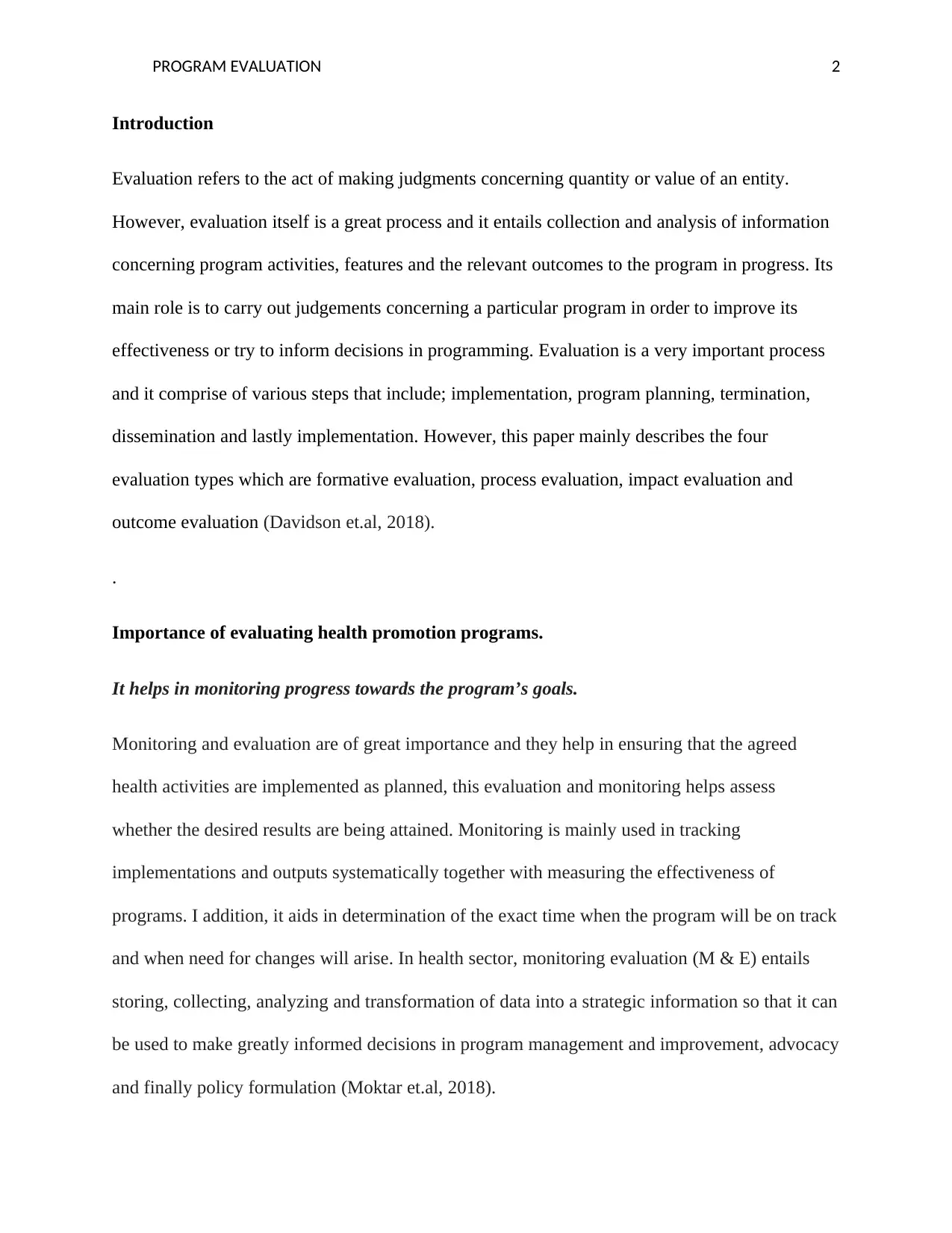
PROGRAM EVALUATION 2
Introduction
Evaluation refers to the act of making judgments concerning quantity or value of an entity.
However, evaluation itself is a great process and it entails collection and analysis of information
concerning program activities, features and the relevant outcomes to the program in progress. Its
main role is to carry out judgements concerning a particular program in order to improve its
effectiveness or try to inform decisions in programming. Evaluation is a very important process
and it comprise of various steps that include; implementation, program planning, termination,
dissemination and lastly implementation. However, this paper mainly describes the four
evaluation types which are formative evaluation, process evaluation, impact evaluation and
outcome evaluation (Davidson et.al, 2018).
.
Importance of evaluating health promotion programs.
It helps in monitoring progress towards the program’s goals.
Monitoring and evaluation are of great importance and they help in ensuring that the agreed
health activities are implemented as planned, this evaluation and monitoring helps assess
whether the desired results are being attained. Monitoring is mainly used in tracking
implementations and outputs systematically together with measuring the effectiveness of
programs. I addition, it aids in determination of the exact time when the program will be on track
and when need for changes will arise. In health sector, monitoring evaluation (M & E) entails
storing, collecting, analyzing and transformation of data into a strategic information so that it can
be used to make greatly informed decisions in program management and improvement, advocacy
and finally policy formulation (Moktar et.al, 2018).
Introduction
Evaluation refers to the act of making judgments concerning quantity or value of an entity.
However, evaluation itself is a great process and it entails collection and analysis of information
concerning program activities, features and the relevant outcomes to the program in progress. Its
main role is to carry out judgements concerning a particular program in order to improve its
effectiveness or try to inform decisions in programming. Evaluation is a very important process
and it comprise of various steps that include; implementation, program planning, termination,
dissemination and lastly implementation. However, this paper mainly describes the four
evaluation types which are formative evaluation, process evaluation, impact evaluation and
outcome evaluation (Davidson et.al, 2018).
.
Importance of evaluating health promotion programs.
It helps in monitoring progress towards the program’s goals.
Monitoring and evaluation are of great importance and they help in ensuring that the agreed
health activities are implemented as planned, this evaluation and monitoring helps assess
whether the desired results are being attained. Monitoring is mainly used in tracking
implementations and outputs systematically together with measuring the effectiveness of
programs. I addition, it aids in determination of the exact time when the program will be on track
and when need for changes will arise. In health sector, monitoring evaluation (M & E) entails
storing, collecting, analyzing and transformation of data into a strategic information so that it can
be used to make greatly informed decisions in program management and improvement, advocacy
and finally policy formulation (Moktar et.al, 2018).
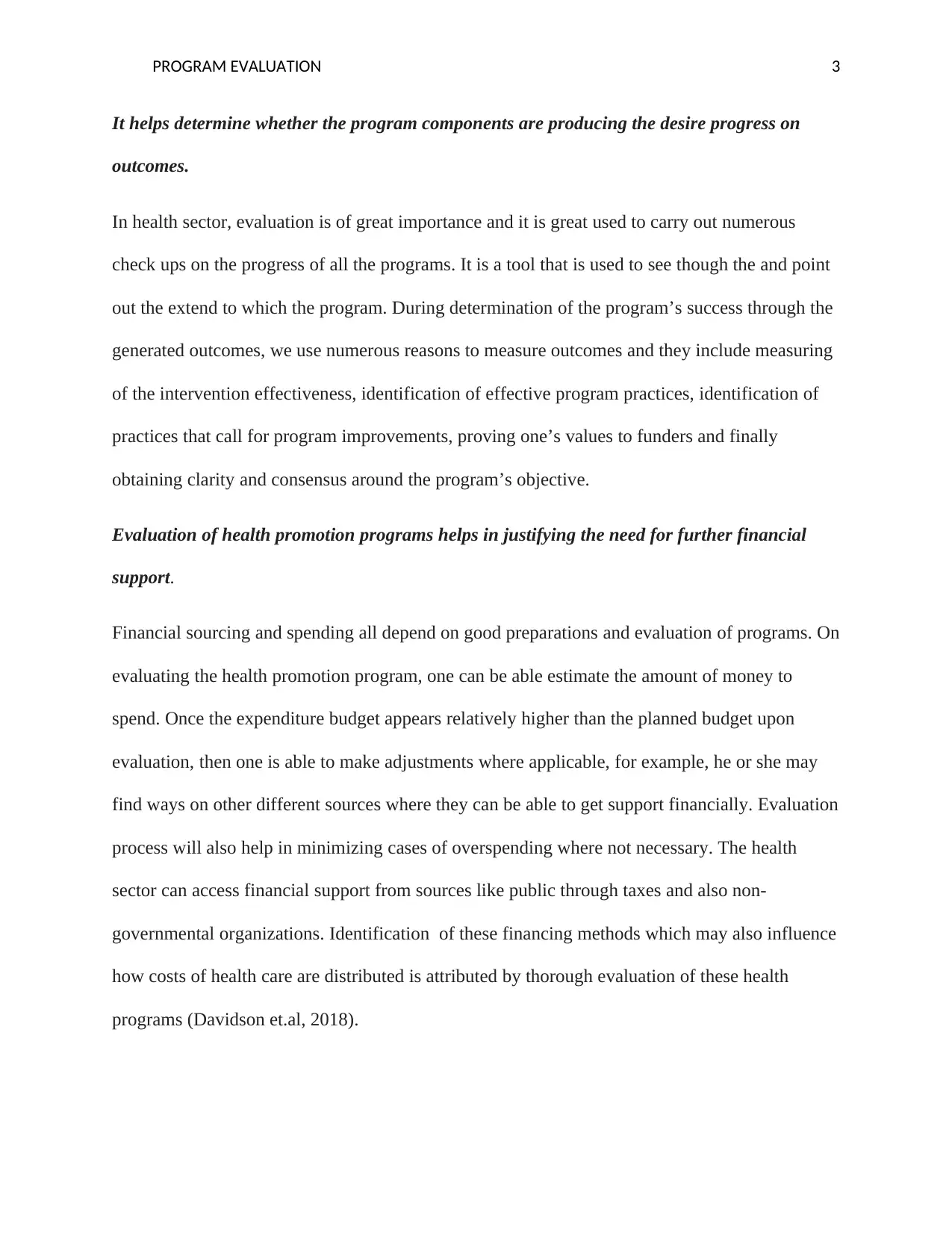
PROGRAM EVALUATION 3
It helps determine whether the program components are producing the desire progress on
outcomes.
In health sector, evaluation is of great importance and it is great used to carry out numerous
check ups on the progress of all the programs. It is a tool that is used to see though the and point
out the extend to which the program. During determination of the program’s success through the
generated outcomes, we use numerous reasons to measure outcomes and they include measuring
of the intervention effectiveness, identification of effective program practices, identification of
practices that call for program improvements, proving one’s values to funders and finally
obtaining clarity and consensus around the program’s objective.
Evaluation of health promotion programs helps in justifying the need for further financial
support.
Financial sourcing and spending all depend on good preparations and evaluation of programs. On
evaluating the health promotion program, one can be able estimate the amount of money to
spend. Once the expenditure budget appears relatively higher than the planned budget upon
evaluation, then one is able to make adjustments where applicable, for example, he or she may
find ways on other different sources where they can be able to get support financially. Evaluation
process will also help in minimizing cases of overspending where not necessary. The health
sector can access financial support from sources like public through taxes and also non-
governmental organizations. Identification of these financing methods which may also influence
how costs of health care are distributed is attributed by thorough evaluation of these health
programs (Davidson et.al, 2018).
It helps determine whether the program components are producing the desire progress on
outcomes.
In health sector, evaluation is of great importance and it is great used to carry out numerous
check ups on the progress of all the programs. It is a tool that is used to see though the and point
out the extend to which the program. During determination of the program’s success through the
generated outcomes, we use numerous reasons to measure outcomes and they include measuring
of the intervention effectiveness, identification of effective program practices, identification of
practices that call for program improvements, proving one’s values to funders and finally
obtaining clarity and consensus around the program’s objective.
Evaluation of health promotion programs helps in justifying the need for further financial
support.
Financial sourcing and spending all depend on good preparations and evaluation of programs. On
evaluating the health promotion program, one can be able estimate the amount of money to
spend. Once the expenditure budget appears relatively higher than the planned budget upon
evaluation, then one is able to make adjustments where applicable, for example, he or she may
find ways on other different sources where they can be able to get support financially. Evaluation
process will also help in minimizing cases of overspending where not necessary. The health
sector can access financial support from sources like public through taxes and also non-
governmental organizations. Identification of these financing methods which may also influence
how costs of health care are distributed is attributed by thorough evaluation of these health
programs (Davidson et.al, 2018).
⊘ This is a preview!⊘
Do you want full access?
Subscribe today to unlock all pages.

Trusted by 1+ million students worldwide
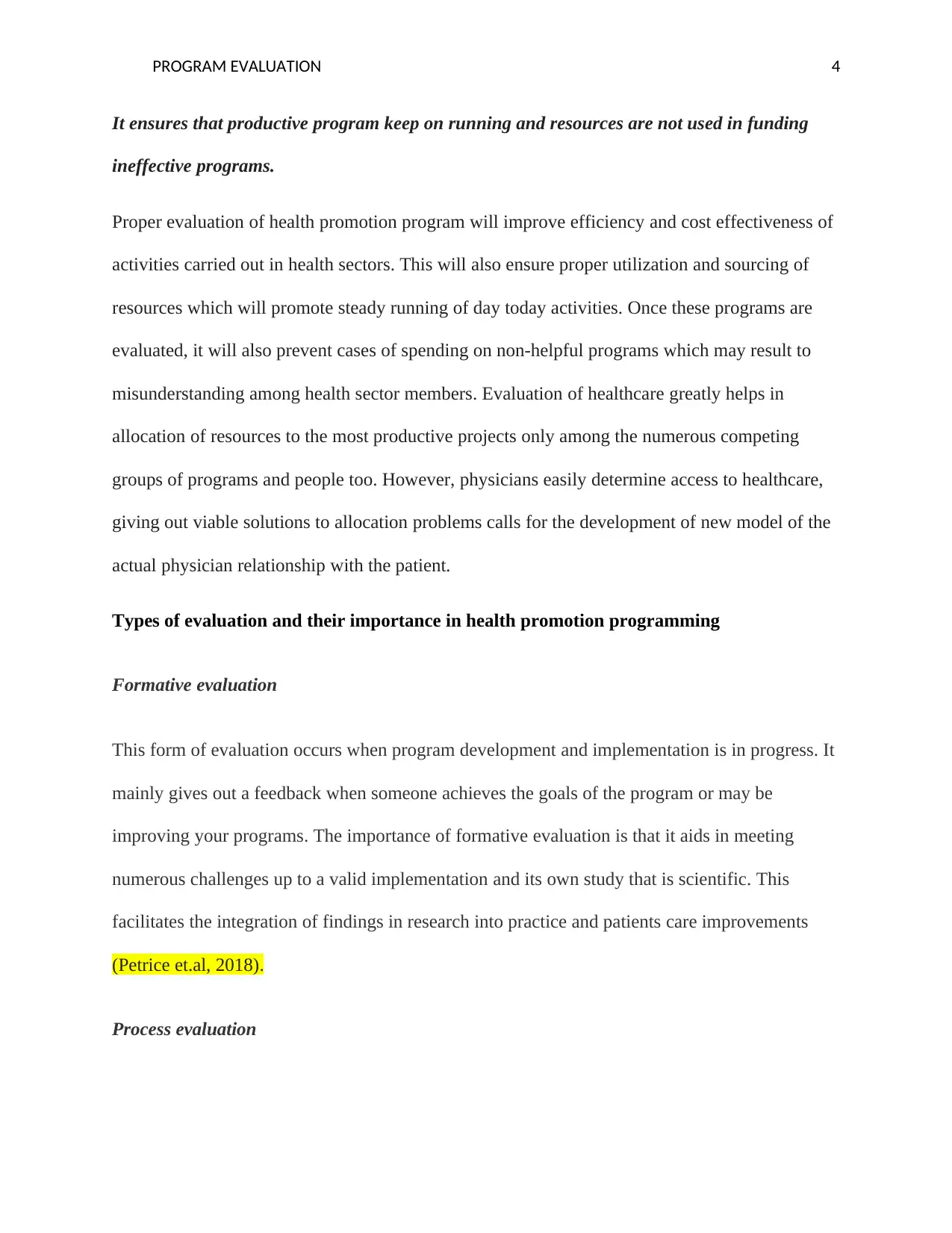
PROGRAM EVALUATION 4
It ensures that productive program keep on running and resources are not used in funding
ineffective programs.
Proper evaluation of health promotion program will improve efficiency and cost effectiveness of
activities carried out in health sectors. This will also ensure proper utilization and sourcing of
resources which will promote steady running of day today activities. Once these programs are
evaluated, it will also prevent cases of spending on non-helpful programs which may result to
misunderstanding among health sector members. Evaluation of healthcare greatly helps in
allocation of resources to the most productive projects only among the numerous competing
groups of programs and people too. However, physicians easily determine access to healthcare,
giving out viable solutions to allocation problems calls for the development of new model of the
actual physician relationship with the patient.
Types of evaluation and their importance in health promotion programming
Formative evaluation
This form of evaluation occurs when program development and implementation is in progress. It
mainly gives out a feedback when someone achieves the goals of the program or may be
improving your programs. The importance of formative evaluation is that it aids in meeting
numerous challenges up to a valid implementation and its own study that is scientific. This
facilitates the integration of findings in research into practice and patients care improvements
(Petrice et.al, 2018).
Process evaluation
It ensures that productive program keep on running and resources are not used in funding
ineffective programs.
Proper evaluation of health promotion program will improve efficiency and cost effectiveness of
activities carried out in health sectors. This will also ensure proper utilization and sourcing of
resources which will promote steady running of day today activities. Once these programs are
evaluated, it will also prevent cases of spending on non-helpful programs which may result to
misunderstanding among health sector members. Evaluation of healthcare greatly helps in
allocation of resources to the most productive projects only among the numerous competing
groups of programs and people too. However, physicians easily determine access to healthcare,
giving out viable solutions to allocation problems calls for the development of new model of the
actual physician relationship with the patient.
Types of evaluation and their importance in health promotion programming
Formative evaluation
This form of evaluation occurs when program development and implementation is in progress. It
mainly gives out a feedback when someone achieves the goals of the program or may be
improving your programs. The importance of formative evaluation is that it aids in meeting
numerous challenges up to a valid implementation and its own study that is scientific. This
facilitates the integration of findings in research into practice and patients care improvements
(Petrice et.al, 2018).
Process evaluation
Paraphrase This Document
Need a fresh take? Get an instant paraphrase of this document with our AI Paraphraser
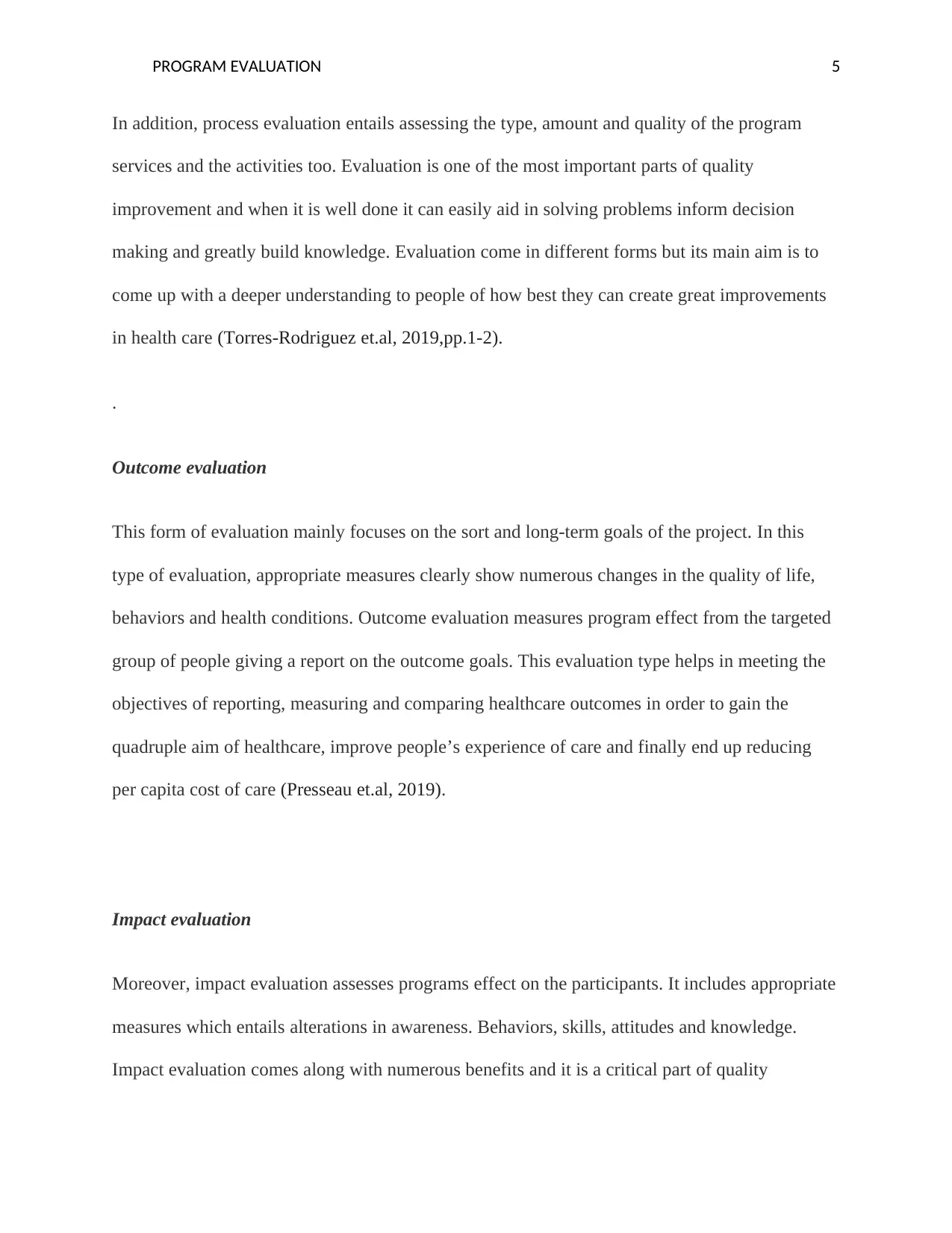
PROGRAM EVALUATION 5
In addition, process evaluation entails assessing the type, amount and quality of the program
services and the activities too. Evaluation is one of the most important parts of quality
improvement and when it is well done it can easily aid in solving problems inform decision
making and greatly build knowledge. Evaluation come in different forms but its main aim is to
come up with a deeper understanding to people of how best they can create great improvements
in health care (Torres-Rodriguez et.al, 2019,pp.1-2).
.
Outcome evaluation
This form of evaluation mainly focuses on the sort and long-term goals of the project. In this
type of evaluation, appropriate measures clearly show numerous changes in the quality of life,
behaviors and health conditions. Outcome evaluation measures program effect from the targeted
group of people giving a report on the outcome goals. This evaluation type helps in meeting the
objectives of reporting, measuring and comparing healthcare outcomes in order to gain the
quadruple aim of healthcare, improve people’s experience of care and finally end up reducing
per capita cost of care (Presseau et.al, 2019).
Impact evaluation
Moreover, impact evaluation assesses programs effect on the participants. It includes appropriate
measures which entails alterations in awareness. Behaviors, skills, attitudes and knowledge.
Impact evaluation comes along with numerous benefits and it is a critical part of quality
In addition, process evaluation entails assessing the type, amount and quality of the program
services and the activities too. Evaluation is one of the most important parts of quality
improvement and when it is well done it can easily aid in solving problems inform decision
making and greatly build knowledge. Evaluation come in different forms but its main aim is to
come up with a deeper understanding to people of how best they can create great improvements
in health care (Torres-Rodriguez et.al, 2019,pp.1-2).
.
Outcome evaluation
This form of evaluation mainly focuses on the sort and long-term goals of the project. In this
type of evaluation, appropriate measures clearly show numerous changes in the quality of life,
behaviors and health conditions. Outcome evaluation measures program effect from the targeted
group of people giving a report on the outcome goals. This evaluation type helps in meeting the
objectives of reporting, measuring and comparing healthcare outcomes in order to gain the
quadruple aim of healthcare, improve people’s experience of care and finally end up reducing
per capita cost of care (Presseau et.al, 2019).
Impact evaluation
Moreover, impact evaluation assesses programs effect on the participants. It includes appropriate
measures which entails alterations in awareness. Behaviors, skills, attitudes and knowledge.
Impact evaluation comes along with numerous benefits and it is a critical part of quality
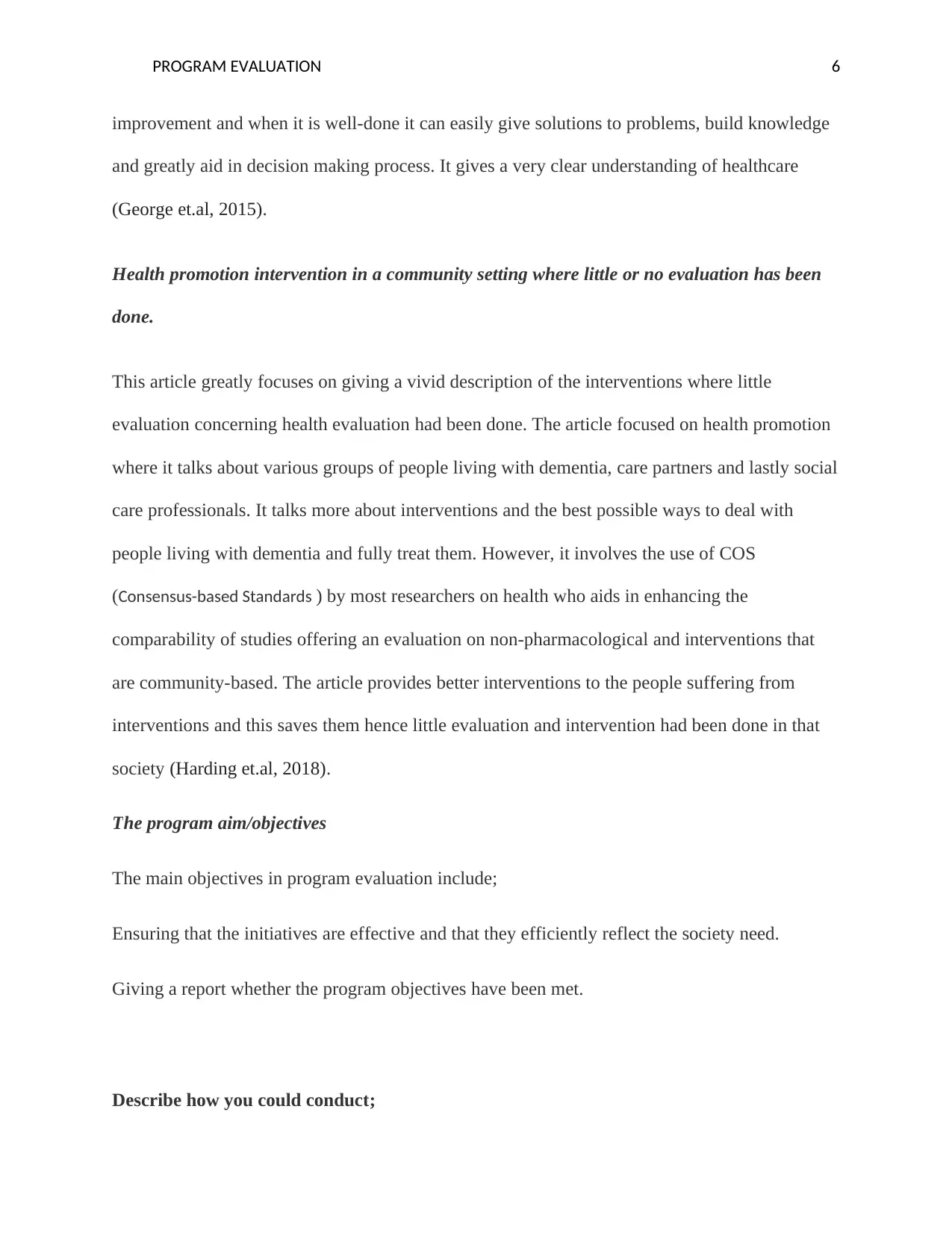
PROGRAM EVALUATION 6
improvement and when it is well-done it can easily give solutions to problems, build knowledge
and greatly aid in decision making process. It gives a very clear understanding of healthcare
(George et.al, 2015).
Health promotion intervention in a community setting where little or no evaluation has been
done.
This article greatly focuses on giving a vivid description of the interventions where little
evaluation concerning health evaluation had been done. The article focused on health promotion
where it talks about various groups of people living with dementia, care partners and lastly social
care professionals. It talks more about interventions and the best possible ways to deal with
people living with dementia and fully treat them. However, it involves the use of COS
(Consensus-based Standards ) by most researchers on health who aids in enhancing the
comparability of studies offering an evaluation on non-pharmacological and interventions that
are community-based. The article provides better interventions to the people suffering from
interventions and this saves them hence little evaluation and intervention had been done in that
society (Harding et.al, 2018).
The program aim/objectives
The main objectives in program evaluation include;
Ensuring that the initiatives are effective and that they efficiently reflect the society need.
Giving a report whether the program objectives have been met.
Describe how you could conduct;
improvement and when it is well-done it can easily give solutions to problems, build knowledge
and greatly aid in decision making process. It gives a very clear understanding of healthcare
(George et.al, 2015).
Health promotion intervention in a community setting where little or no evaluation has been
done.
This article greatly focuses on giving a vivid description of the interventions where little
evaluation concerning health evaluation had been done. The article focused on health promotion
where it talks about various groups of people living with dementia, care partners and lastly social
care professionals. It talks more about interventions and the best possible ways to deal with
people living with dementia and fully treat them. However, it involves the use of COS
(Consensus-based Standards ) by most researchers on health who aids in enhancing the
comparability of studies offering an evaluation on non-pharmacological and interventions that
are community-based. The article provides better interventions to the people suffering from
interventions and this saves them hence little evaluation and intervention had been done in that
society (Harding et.al, 2018).
The program aim/objectives
The main objectives in program evaluation include;
Ensuring that the initiatives are effective and that they efficiently reflect the society need.
Giving a report whether the program objectives have been met.
Describe how you could conduct;
⊘ This is a preview!⊘
Do you want full access?
Subscribe today to unlock all pages.

Trusted by 1+ million students worldwide
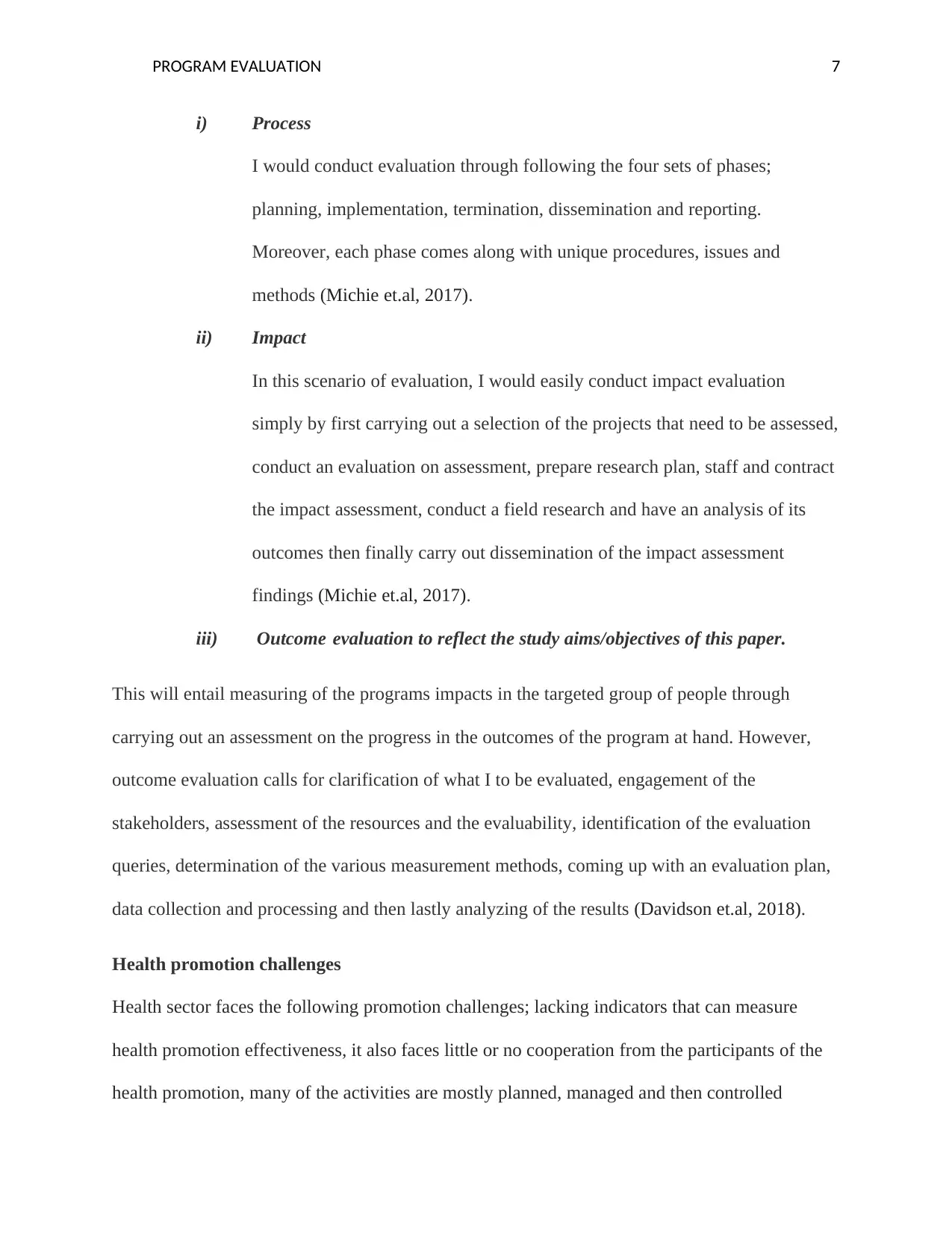
PROGRAM EVALUATION 7
i) Process
I would conduct evaluation through following the four sets of phases;
planning, implementation, termination, dissemination and reporting.
Moreover, each phase comes along with unique procedures, issues and
methods (Michie et.al, 2017).
ii) Impact
In this scenario of evaluation, I would easily conduct impact evaluation
simply by first carrying out a selection of the projects that need to be assessed,
conduct an evaluation on assessment, prepare research plan, staff and contract
the impact assessment, conduct a field research and have an analysis of its
outcomes then finally carry out dissemination of the impact assessment
findings (Michie et.al, 2017).
iii) Outcome evaluation to reflect the study aims/objectives of this paper.
This will entail measuring of the programs impacts in the targeted group of people through
carrying out an assessment on the progress in the outcomes of the program at hand. However,
outcome evaluation calls for clarification of what I to be evaluated, engagement of the
stakeholders, assessment of the resources and the evaluability, identification of the evaluation
queries, determination of the various measurement methods, coming up with an evaluation plan,
data collection and processing and then lastly analyzing of the results (Davidson et.al, 2018).
Health promotion challenges
Health sector faces the following promotion challenges; lacking indicators that can measure
health promotion effectiveness, it also faces little or no cooperation from the participants of the
health promotion, many of the activities are mostly planned, managed and then controlled
i) Process
I would conduct evaluation through following the four sets of phases;
planning, implementation, termination, dissemination and reporting.
Moreover, each phase comes along with unique procedures, issues and
methods (Michie et.al, 2017).
ii) Impact
In this scenario of evaluation, I would easily conduct impact evaluation
simply by first carrying out a selection of the projects that need to be assessed,
conduct an evaluation on assessment, prepare research plan, staff and contract
the impact assessment, conduct a field research and have an analysis of its
outcomes then finally carry out dissemination of the impact assessment
findings (Michie et.al, 2017).
iii) Outcome evaluation to reflect the study aims/objectives of this paper.
This will entail measuring of the programs impacts in the targeted group of people through
carrying out an assessment on the progress in the outcomes of the program at hand. However,
outcome evaluation calls for clarification of what I to be evaluated, engagement of the
stakeholders, assessment of the resources and the evaluability, identification of the evaluation
queries, determination of the various measurement methods, coming up with an evaluation plan,
data collection and processing and then lastly analyzing of the results (Davidson et.al, 2018).
Health promotion challenges
Health sector faces the following promotion challenges; lacking indicators that can measure
health promotion effectiveness, it also faces little or no cooperation from the participants of the
health promotion, many of the activities are mostly planned, managed and then controlled
Paraphrase This Document
Need a fresh take? Get an instant paraphrase of this document with our AI Paraphraser
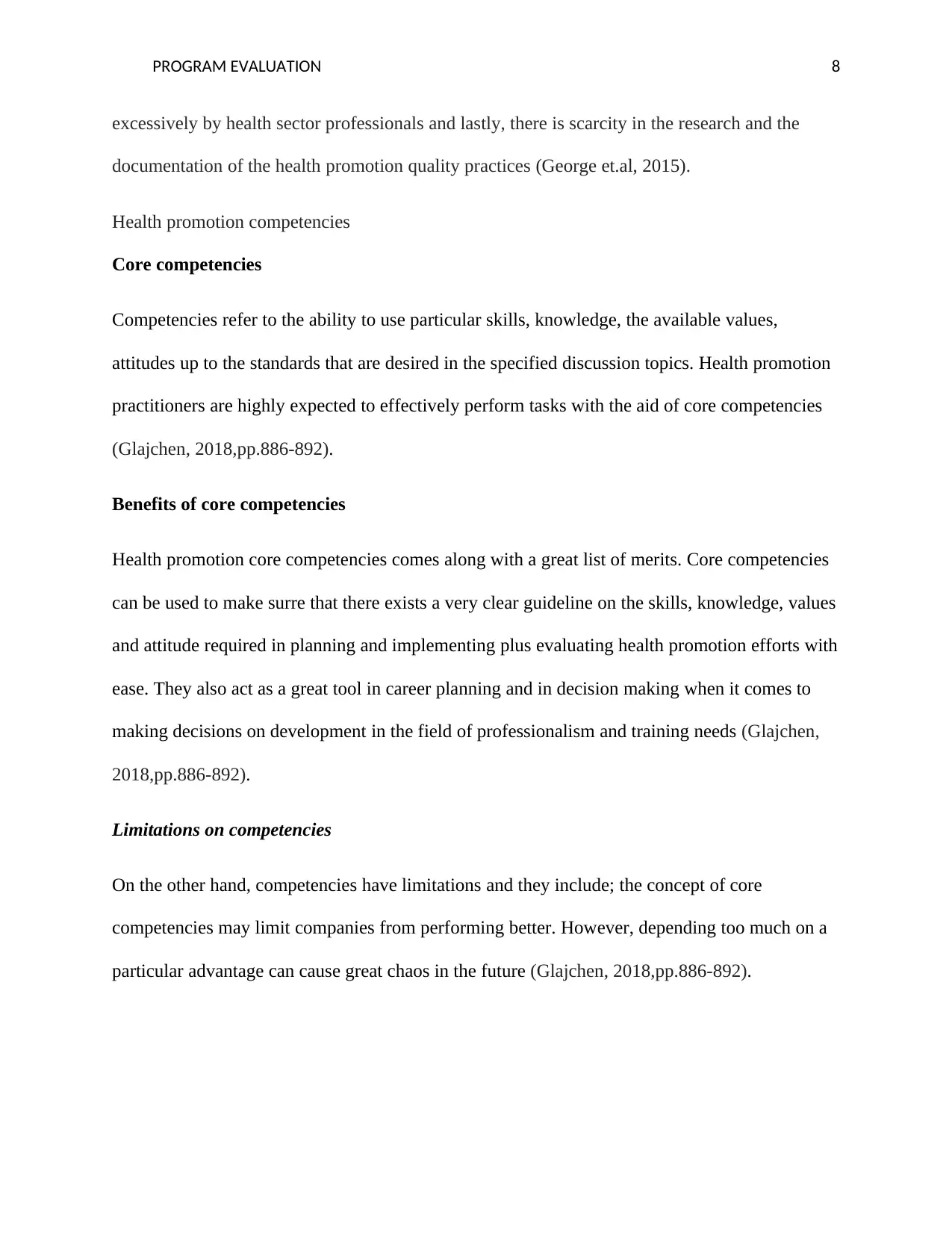
PROGRAM EVALUATION 8
excessively by health sector professionals and lastly, there is scarcity in the research and the
documentation of the health promotion quality practices (George et.al, 2015).
Health promotion competencies
Core competencies
Competencies refer to the ability to use particular skills, knowledge, the available values,
attitudes up to the standards that are desired in the specified discussion topics. Health promotion
practitioners are highly expected to effectively perform tasks with the aid of core competencies
(Glajchen, 2018,pp.886-892).
Benefits of core competencies
Health promotion core competencies comes along with a great list of merits. Core competencies
can be used to make surre that there exists a very clear guideline on the skills, knowledge, values
and attitude required in planning and implementing plus evaluating health promotion efforts with
ease. They also act as a great tool in career planning and in decision making when it comes to
making decisions on development in the field of professionalism and training needs (Glajchen,
2018,pp.886-892).
Limitations on competencies
On the other hand, competencies have limitations and they include; the concept of core
competencies may limit companies from performing better. However, depending too much on a
particular advantage can cause great chaos in the future (Glajchen, 2018,pp.886-892).
excessively by health sector professionals and lastly, there is scarcity in the research and the
documentation of the health promotion quality practices (George et.al, 2015).
Health promotion competencies
Core competencies
Competencies refer to the ability to use particular skills, knowledge, the available values,
attitudes up to the standards that are desired in the specified discussion topics. Health promotion
practitioners are highly expected to effectively perform tasks with the aid of core competencies
(Glajchen, 2018,pp.886-892).
Benefits of core competencies
Health promotion core competencies comes along with a great list of merits. Core competencies
can be used to make surre that there exists a very clear guideline on the skills, knowledge, values
and attitude required in planning and implementing plus evaluating health promotion efforts with
ease. They also act as a great tool in career planning and in decision making when it comes to
making decisions on development in the field of professionalism and training needs (Glajchen,
2018,pp.886-892).
Limitations on competencies
On the other hand, competencies have limitations and they include; the concept of core
competencies may limit companies from performing better. However, depending too much on a
particular advantage can cause great chaos in the future (Glajchen, 2018,pp.886-892).
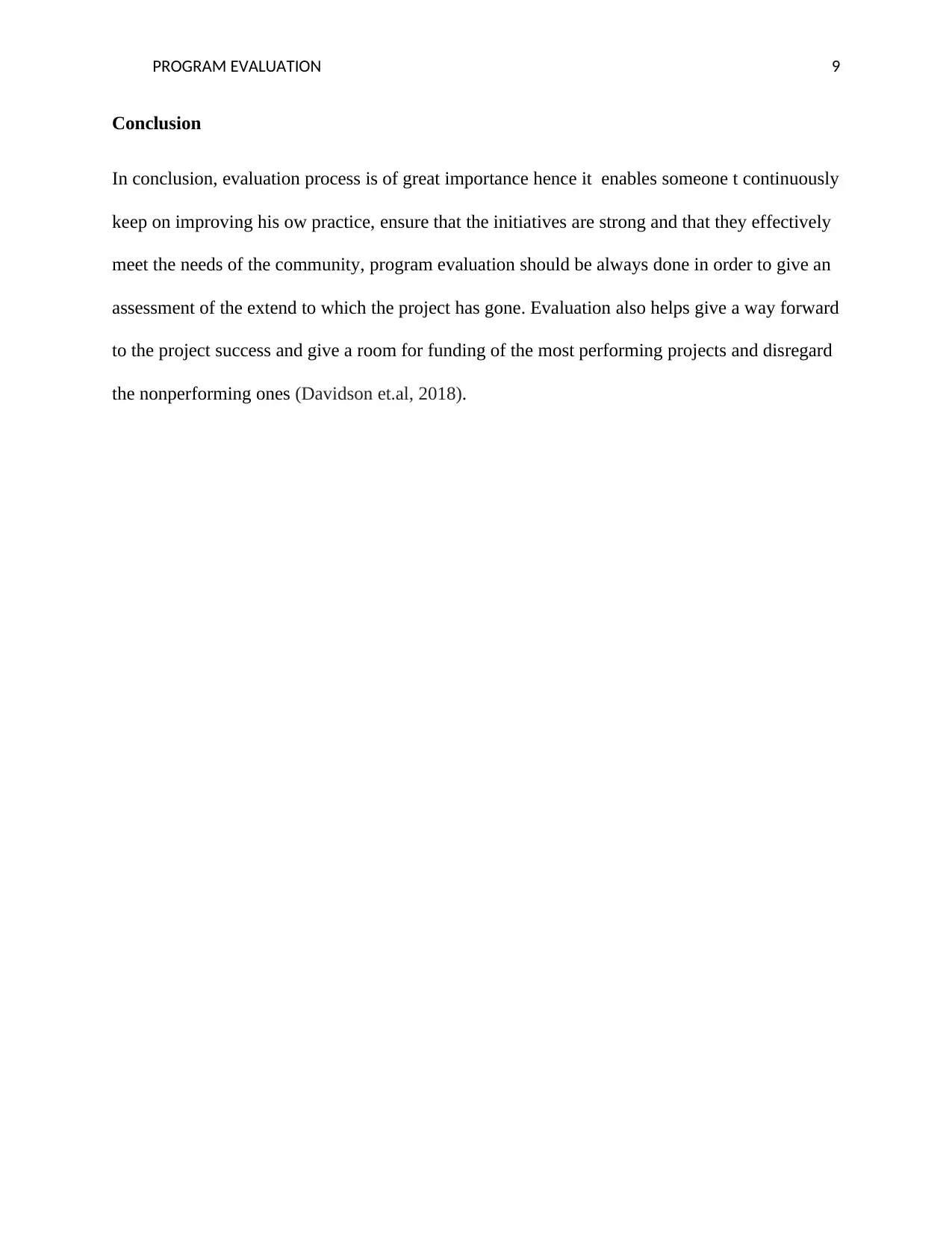
PROGRAM EVALUATION 9
Conclusion
In conclusion, evaluation process is of great importance hence it enables someone t continuously
keep on improving his ow practice, ensure that the initiatives are strong and that they effectively
meet the needs of the community, program evaluation should be always done in order to give an
assessment of the extend to which the project has gone. Evaluation also helps give a way forward
to the project success and give a room for funding of the most performing projects and disregard
the nonperforming ones (Davidson et.al, 2018).
Conclusion
In conclusion, evaluation process is of great importance hence it enables someone t continuously
keep on improving his ow practice, ensure that the initiatives are strong and that they effectively
meet the needs of the community, program evaluation should be always done in order to give an
assessment of the extend to which the project has gone. Evaluation also helps give a way forward
to the project success and give a room for funding of the most performing projects and disregard
the nonperforming ones (Davidson et.al, 2018).
⊘ This is a preview!⊘
Do you want full access?
Subscribe today to unlock all pages.

Trusted by 1+ million students worldwide
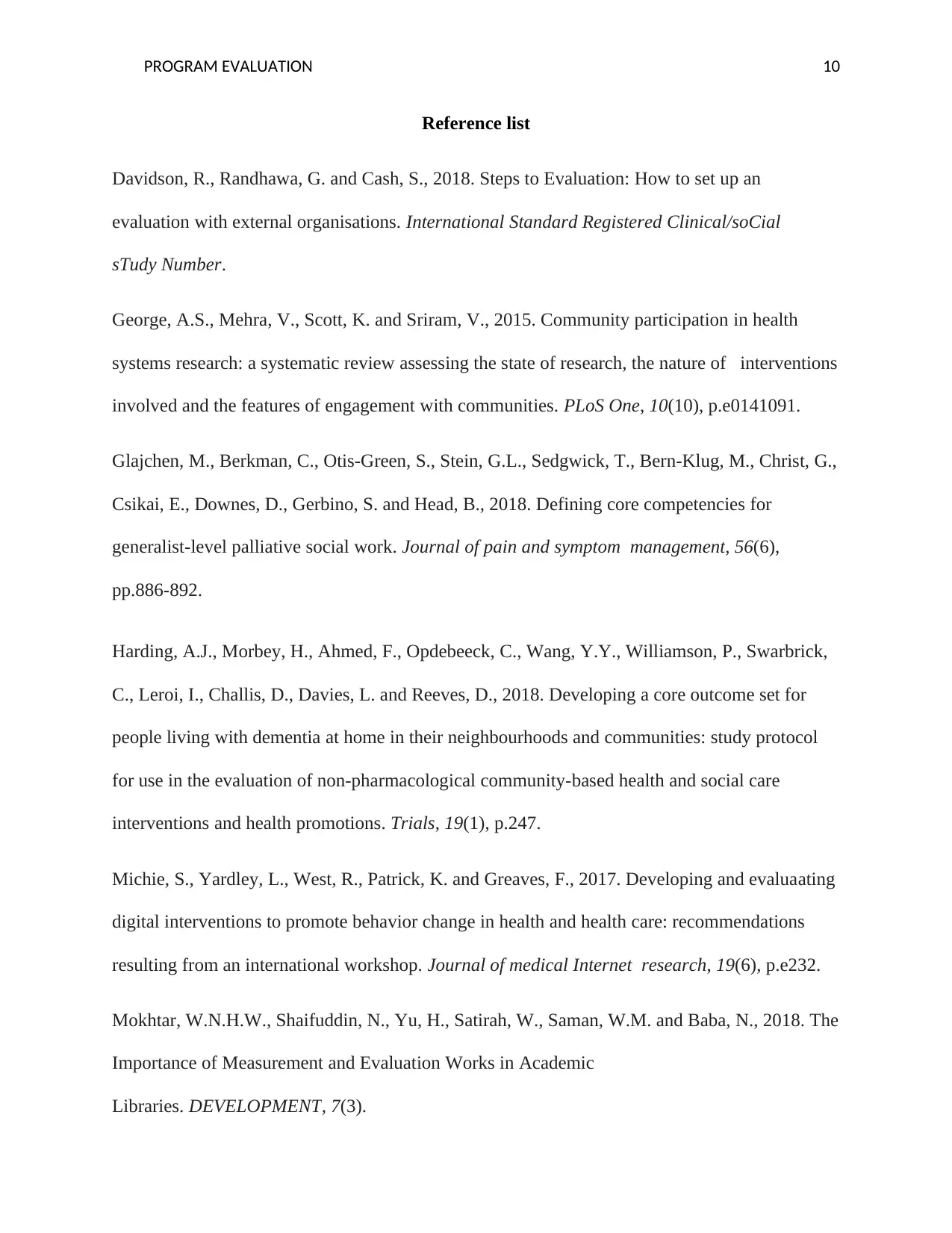
PROGRAM EVALUATION 10
Reference list
Davidson, R., Randhawa, G. and Cash, S., 2018. Steps to Evaluation: How to set up an
evaluation with external organisations. International Standard Registered Clinical/soCial
sTudy Number.
George, A.S., Mehra, V., Scott, K. and Sriram, V., 2015. Community participation in health
systems research: a systematic review assessing the state of research, the nature of interventions
involved and the features of engagement with communities. PLoS One, 10(10), p.e0141091.
Glajchen, M., Berkman, C., Otis-Green, S., Stein, G.L., Sedgwick, T., Bern-Klug, M., Christ, G.,
Csikai, E., Downes, D., Gerbino, S. and Head, B., 2018. Defining core competencies for
generalist-level palliative social work. Journal of pain and symptom management, 56(6),
pp.886-892.
Harding, A.J., Morbey, H., Ahmed, F., Opdebeeck, C., Wang, Y.Y., Williamson, P., Swarbrick,
C., Leroi, I., Challis, D., Davies, L. and Reeves, D., 2018. Developing a core outcome set for
people living with dementia at home in their neighbourhoods and communities: study protocol
for use in the evaluation of non-pharmacological community-based health and social care
interventions and health promotions. Trials, 19(1), p.247.
Michie, S., Yardley, L., West, R., Patrick, K. and Greaves, F., 2017. Developing and evaluaating
digital interventions to promote behavior change in health and health care: recommendations
resulting from an international workshop. Journal of medical Internet research, 19(6), p.e232.
Mokhtar, W.N.H.W., Shaifuddin, N., Yu, H., Satirah, W., Saman, W.M. and Baba, N., 2018. The
Importance of Measurement and Evaluation Works in Academic
Libraries. DEVELOPMENT, 7(3).
Reference list
Davidson, R., Randhawa, G. and Cash, S., 2018. Steps to Evaluation: How to set up an
evaluation with external organisations. International Standard Registered Clinical/soCial
sTudy Number.
George, A.S., Mehra, V., Scott, K. and Sriram, V., 2015. Community participation in health
systems research: a systematic review assessing the state of research, the nature of interventions
involved and the features of engagement with communities. PLoS One, 10(10), p.e0141091.
Glajchen, M., Berkman, C., Otis-Green, S., Stein, G.L., Sedgwick, T., Bern-Klug, M., Christ, G.,
Csikai, E., Downes, D., Gerbino, S. and Head, B., 2018. Defining core competencies for
generalist-level palliative social work. Journal of pain and symptom management, 56(6),
pp.886-892.
Harding, A.J., Morbey, H., Ahmed, F., Opdebeeck, C., Wang, Y.Y., Williamson, P., Swarbrick,
C., Leroi, I., Challis, D., Davies, L. and Reeves, D., 2018. Developing a core outcome set for
people living with dementia at home in their neighbourhoods and communities: study protocol
for use in the evaluation of non-pharmacological community-based health and social care
interventions and health promotions. Trials, 19(1), p.247.
Michie, S., Yardley, L., West, R., Patrick, K. and Greaves, F., 2017. Developing and evaluaating
digital interventions to promote behavior change in health and health care: recommendations
resulting from an international workshop. Journal of medical Internet research, 19(6), p.e232.
Mokhtar, W.N.H.W., Shaifuddin, N., Yu, H., Satirah, W., Saman, W.M. and Baba, N., 2018. The
Importance of Measurement and Evaluation Works in Academic
Libraries. DEVELOPMENT, 7(3).
Paraphrase This Document
Need a fresh take? Get an instant paraphrase of this document with our AI Paraphraser
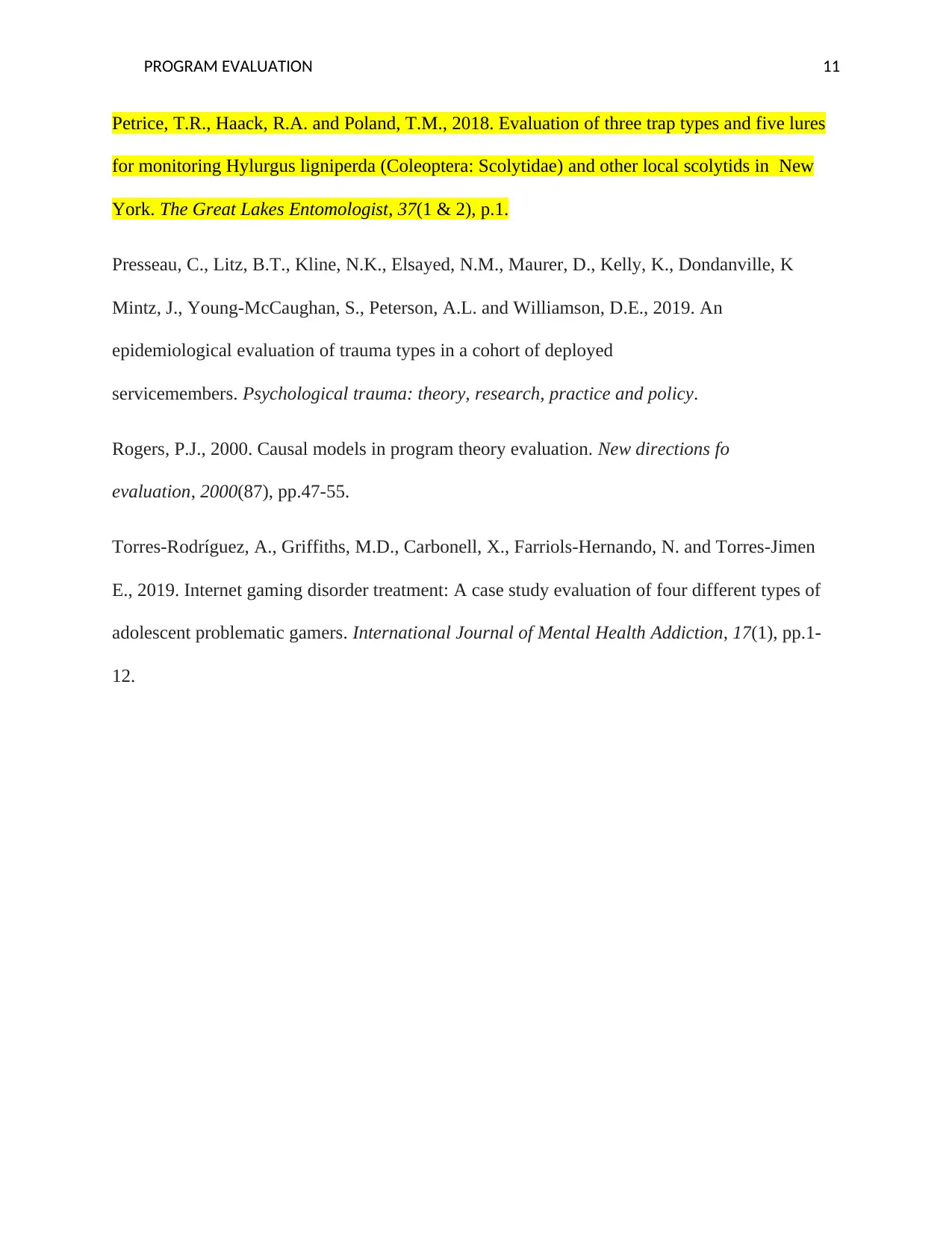
PROGRAM EVALUATION 11
Petrice, T.R., Haack, R.A. and Poland, T.M., 2018. Evaluation of three trap types and five lures
for monitoring Hylurgus ligniperda (Coleoptera: Scolytidae) and other local scolytids in New
York. The Great Lakes Entomologist, 37(1 & 2), p.1.
Presseau, C., Litz, B.T., Kline, N.K., Elsayed, N.M., Maurer, D., Kelly, K., Dondanville, K
Mintz, J., Young-McCaughan, S., Peterson, A.L. and Williamson, D.E., 2019. An
epidemiological evaluation of trauma types in a cohort of deployed
servicemembers. Psychological trauma: theory, research, practice and policy.
Rogers, P.J., 2000. Causal models in program theory evaluation. New directions fo
evaluation, 2000(87), pp.47-55.
Torres-Rodríguez, A., Griffiths, M.D., Carbonell, X., Farriols-Hernando, N. and Torres-Jimen
E., 2019. Internet gaming disorder treatment: A case study evaluation of four different types of
adolescent problematic gamers. International Journal of Mental Health Addiction, 17(1), pp.1-
12.
Petrice, T.R., Haack, R.A. and Poland, T.M., 2018. Evaluation of three trap types and five lures
for monitoring Hylurgus ligniperda (Coleoptera: Scolytidae) and other local scolytids in New
York. The Great Lakes Entomologist, 37(1 & 2), p.1.
Presseau, C., Litz, B.T., Kline, N.K., Elsayed, N.M., Maurer, D., Kelly, K., Dondanville, K
Mintz, J., Young-McCaughan, S., Peterson, A.L. and Williamson, D.E., 2019. An
epidemiological evaluation of trauma types in a cohort of deployed
servicemembers. Psychological trauma: theory, research, practice and policy.
Rogers, P.J., 2000. Causal models in program theory evaluation. New directions fo
evaluation, 2000(87), pp.47-55.
Torres-Rodríguez, A., Griffiths, M.D., Carbonell, X., Farriols-Hernando, N. and Torres-Jimen
E., 2019. Internet gaming disorder treatment: A case study evaluation of four different types of
adolescent problematic gamers. International Journal of Mental Health Addiction, 17(1), pp.1-
12.
1 out of 11
Related Documents
Your All-in-One AI-Powered Toolkit for Academic Success.
+13062052269
info@desklib.com
Available 24*7 on WhatsApp / Email
![[object Object]](/_next/static/media/star-bottom.7253800d.svg)
Unlock your academic potential
Copyright © 2020–2025 A2Z Services. All Rights Reserved. Developed and managed by ZUCOL.




